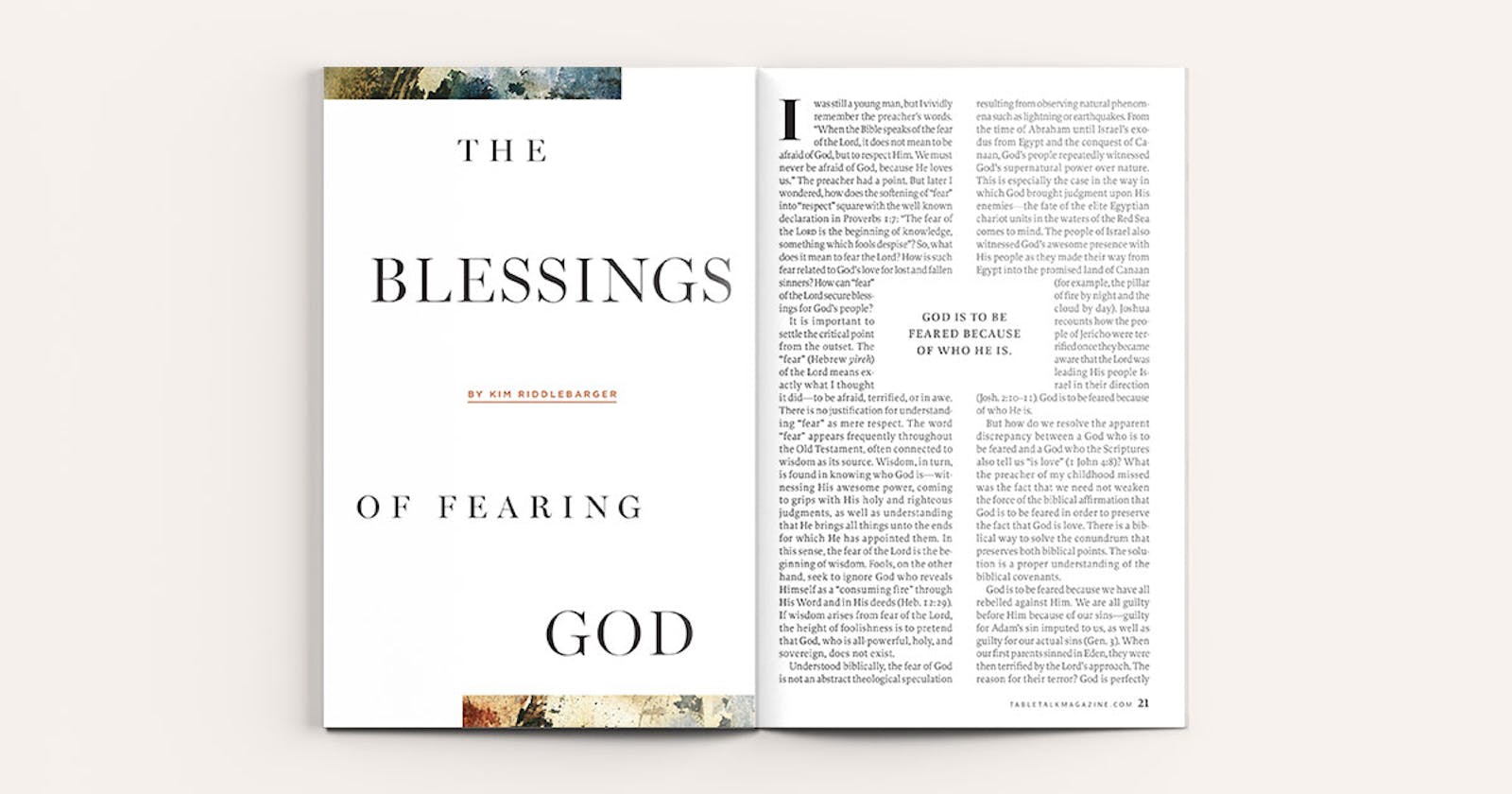
Request your free, three-month trial to Tabletalk magazine. You’ll receive the print issue monthly and gain immediate digital access to decades of archives. This trial is risk-free. No credit card required.
Try Tabletalk NowAlready receive Tabletalk magazine every month?
Verify your email address to gain unlimited access.
I was still a young man, but I vividly remember the preacher’s words. “When the Bible speaks of the fear of the Lord, it does not mean to be afraid of God, but to respect Him. We must never be afraid of God, because He loves us.” The preacher had a point. But later I wondered, how does the softening of “fear” into “respect” square with the well-known declaration in Proverbs 1:7: “The fear of the Lord is the beginning of knowledge, something which fools despise”? So, what does it mean to fear the Lord? How is such fear related to God’s love for lost and fallen sinners? How can “fear” of the Lord secure blessings for God’s people?
It is important to settle the critical point from the outset. The “fear” (Hebrew yireh) of the Lord means exactly what I thought it did—to be afraid, terrified, or in awe. There is no justification for understanding “fear” as mere respect. The word “fear” appears frequently throughout the Old Testament, often connected to wisdom as its source. Wisdom, in turn, is found in knowing who God is—witnessing His awesome power, coming to grips with His holy and righteous judgments, as well as understanding that He brings all things unto the ends for which He has appointed them. In this sense, the fear of the Lord is the beginning of wisdom. Fools, on the other hand, seek to ignore God who reveals Himself as a “consuming fire” through His Word and in His deeds (Heb. 12:29). If wisdom arises from fear of the Lord, the height of foolishness is to pretend that God, who is all-powerful, holy, and sovereign, does not exist.
Understood biblically, the fear of God is not an abstract theological speculation resulting from observing natural phenomena such as lightning or earthquakes. From the time of Abraham until Israel’s exodus from Egypt and the conquest of Canaan, God’s people repeatedly witnessed God’s supernatural power over nature. This is especially the case in the way in which God brought judgment upon His enemies—the fate of the elite Egyptian chariot units in the waters of the Red Sea comes to mind. The people of Israel also witnessed God’s awesome presence with His people as they made their way from Egypt into the promised land of Canaan (for example, the pillar of fire by night and the cloud by day). Joshua recounts how the people of Jericho were terrified once they became aware that the Lord was leading His people Israel in their direction (Josh. 2:10–11). God is to be feared because of who He is.
But how do we resolve the apparent discrepancy between a God who is to be feared and a God who the Scriptures also tell us “is love” (1 John 4:8)? What the preacher of my childhood missed was the fact that we need not weaken the force of the biblical affirmation that God is to be feared in order to preserve the fact that God is love. There is a biblical way to solve the conundrum that preserves both biblical points. The solution is a proper understanding of the biblical covenants.
God is to be feared because we have all rebelled against Him. We are all guilty before Him because of our sins—guilty for Adam’s sin imputed to us, as well as guilty for our actual sins (Gen. 3). When our first parents sinned in Eden, they were then terrified by the Lord’s approach. The reason for their terror? God is perfectly and absolutely holy. Adam and Eve were once innocent. After the fall, however, the rebels were cast from Eden because they were guilty. From that moment until now, we have had to fear God because He is holy, we are sinners, and all human sin must be punished.
Yet the Scriptures also teach that God was present with His people immediately after Adam’s fall. God’s presence was one of the blessings of the gracious covenant God promised to Adam (Gen.3:15) and then later ratified with God’s call of Abraham (12; 15; 17; 22:1–19). Abraham was told that he would be the father of a great nation with countless descendants who would become as numerous as the stars in heaven. This people (Israel) would become a great nation, possessing the Land of Promise between the Nile and the Euphrates rivers. All the members of this covenant are beneficiaries of God’s gracious promise to save His people from the guilt of their sin—alleviating their fear that they would receive the same judgments that they had seen fall on God’s enemies.
Abraham’s children later sojourned in Egypt, only to find themselves, generations later, slaves of Pharaoh. Upon Israel’s exodus from Egypt and entrance into the Sinai wilderness, God directed His people to the foot of Mount Sinai, where He made an additional covenant with Israel (the Sinaitic or Mosaic covenant). Reflecting elements of His original covenant with Adam (commandments are given) as well as His gracious covenant with Abraham (God reckons His people righteous through faith in His covenant promise), the Sinai covenant promised Israel blessings for obedience to His commandments and also threatened curses for disobedience.
This brief synopsis reminds us that the story of redemption is that of an all-powerful, holy, and sovereign God who is to be feared and who graciously calls to Himself a people through whom the promises made to Abraham will be fulfilled. Assembled on the plains of Moab and about to enter the Promised Land of Canaan (Deut. 28:1–14), the people of Israel are reminded by Moses, in a remarkable scene, of the blessings promised them through obedience to the Lord’s covenant, as well as threats of what will happen if the people of Israel cease to fear God, no longer trust in His gracious promise to deliver them from their sins, and instead seek the false gods of their soon-to-be Canaanite neighbors.

Under the terms of this covenant, there were material blessings promised (long life, material prosperity, protection from enemies) as well as spiritual blessings. The material blessings of Canaan are tangible pictures of invisible spiritual realities of which we cannot yet conceive—eternal life in the presence of God. The psalmist can say of God’s people under the terms of this covenant, “Blessed is the man who fears the Lord, who greatly delights in his commandments! His offspring will be mighty in the land; the generation of the upright will be blessed” (Ps. 112:1–2). Those who fear God (acknowledge that He is all-powerful, holy, and sovereign) and also believe His promise to deliver them from His wrath (trust in a coming Messiah) will be blessed. God has so promised.
With the coming of Jesus Christ, God’s people can properly understand how wonderful blessings arise from the fear of God. As Christians who are members of the new covenant (foretold by Jer. 31:31–34 to supersede the old covenant), we know that our inability to obey His commandments once condemned us. Now these same commandments are written upon our hearts. There is a full and final forgiveness of sin. We who once were God’s enemies are now His friends (Rom. 5:1–10). With grateful hearts, we now desire to obey God’s commandments, and we will receive the blessings promised to us when we do so. There are promises of a long life (Prov. 10:27; Eph. 6:2–3), answered prayer (James 5:16), peace with civil authorities (Rom. 13:1–7), and even deliverance from heresy and Satanic deception (1 John 2:18–25).
God’s commandments reflect His intrinsic holiness. Our inability to obey His commands reminds us of why the holy God is to be feared. We know the biblical record. We have read of God pouring out His wrath and fury upon His enemies in the days of Noah (the flood) and in the plagues sent upon Egypt. We have read of a final judgment yet to come (Rev. 6:12–17). But we also read of God pouring out His wrath upon Jesus Christ, sparing us from the wrath that is to come. In this moment, Paul tells us, the love and justice of God meet (Rom. 3:21–29).
At the foot of the cross of Jesus Christ, we find the answers to our original questions about the “fear of the Lord.” Yes, God is to be feared—not just respected—even by a Christian who trusts in Jesus Christ. God is holy, righteous, and powerful. But we are sinful, we deserve His wrath, and we are weak and frail. Were it not for the cross, we too would be consumed by the wrath of God and would receive all the threatened curses. The very thought of life apart from Christ’s cross stirs fear, terror, and awe. Since God is love, in the God-man Christ Jesus He took our sins upon Himself, removing them from us as far as the east is from the west. While we fear God because of who He is, we need never fear His approach because His wrath and anger toward us have been turned aside at Calvary.
The fear of the Lord remains, then, a great source of blessing. Knowing that Jesus was punished for my sins in my place reminds me both that God is to be feared (He takes sin seriously) and yet is love (of which the cross is the sign). Now that my sins are washed away, I can obey God, knowing that He is pleased with my pitiful efforts because I am accepted in the person and work of His Son. This is how all His promised blessings become mine—because I fear the Lord having found forgiveness through the cross of Jesus Christ.
